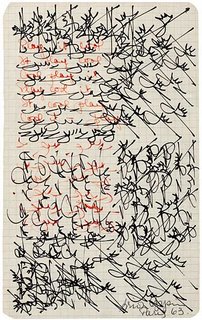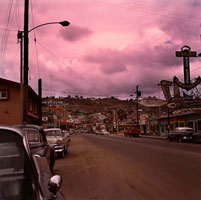Homegrown's All Right with Me
walter martinpaloma munoz, traveler 80 at night
Jim Watt, Americun
--klipschutz
Secretary of the Interior under Ronald Reagan;
village explainer of the Apocalyptic New Right: I’m treated differently
I believe in fishing
No taxpayers dollars were
ever used
There’s no interest in selling
any National Park
I used to attend parties there
I believe in government,
you bet
If the President asks me to
We’re not going to let you
mine in the National Parks
The greatest protection
to whales, mammals and birds
is off shore drilling
We don’t have all the answers
we need on acid rain
The liberals oughtta learn
to laugh
The poor love me
The unemployed love me
Deaf mutes, quadriplegics,
Mothers and Dads
of day-old triplets
born without cerebral cortexes,
Beach bums, sea urchins,
Dancing bears and cashiers
at the Capitol cafeteria—
Sometimes it’s embarrassing
It’s more like worship
And for what? Clear thinking.
The proof is in the pudding
but so is the spoon
See what I mean?
My few critics are excellent
manipulators
If you’re interested in mining,
the answer is definitely not
We’re not done
As I was saying
Afro Americans adore me
Billiard bald women
(the pivotal voting bloc
in the last election)
won’t leave me be—
Every day another one
sneaks into my office
and begs me to give her a son
We have no authority to sell Mexico
We’re seeking legislation
The rich college students
like to protest against me
Blessed are the meek
(who, by the way,
are among my most
vocal supporters)
for they shall inherit
the national sport of
football,
the finest game in
the history of Creation
I feel that we’ve made
significant progress
We’re not done
We like to get reactions
The little woman
is quite a gal
but the Man Upstairs outdid Himself
when he made the pick up truck
When I see one I can’t be responsible—
Sometimes I speak in tongues
Sometimes I shoot out all the tires
and tell my driver to peel out
He belongs to the Sierra Club
and knits
He sends all his money
to his family in Michigan
so he doesn’t have any
to save the baby seals
or the bobby seals or whoever
he must get junk mail from
since if you’re on one
of those mailing lists
you’re on them all
He lives in groundless fear
that he’ll lose this job
"Will that be all, sir?"
he said, just barely trembling,
after we’d driven out to
survey a portion of
the national forest
we’ll soon be able to develop
the natural resources of
so we all can share
a wide open wilderness
of prosperity.
And in the shade of a big tree
with thick bark on the edge of
the forest (the kind with needles
instead of leaves)
I had him dig a little grave
(with a spade requisitioned
in triplicate)
for the book he’s been
ruining his eyes on
(he must have it memorized by now
anyway) the past two months—
The Selected Works of Henry David Thoreau(Never ever trust a man, Dad told us,
with two first names: He’s using ’em both,
only to different folks out of opposite sides
of his mouth)
"Fine work, young fellow," I told him.
"It's such a nice day I think I’ll have
a refreshing soft drink before we rush off."
As he walked to the car, I noticed
how gray his hair was getting.
For a few brief seconds I closed my eyes,
basking in the glorious sunlight of liberty,
random phrases popping into my head from
the many letters of support I had received
yesterday.
"Make sure and get one for yourself," I hollered.
He reached into the trunk.
I hadn’t realized how hot it was.
Almost like a race, we practically inhaled
our 16 ouncers of Coke.
"Sir, that really hits the spot," he said.
"You’ll be an Americun yet, lad," I told him.
I guess I'm not as young as I used to be,
the boy must’ve beat me by 15 feet
in the bottle-throw.
Of course he thinks he's ‘hip
to me’ (in the slang
of his sad crowd) but sometimes
you have to take time out
from major national policy decisions
and take an interest in the People,
in a confused young man swayed by
tricky distortions wrapped in pretty
ribbons of half truth.
The love of the millions I am sometimes
guilty of taking for granted.
But the way I feel when I see the look—
of puppydog Devotion, hard won Respect—
in his true blue hundred percent
card carrying all Americun eyes,
it makes me feel like teaching a lesson
to the whole godforsaken Red Army
with my bare hands, Praise the Lord.















